PPMP20008 Term 1: Reflective Report on Project Management Lessons
VerifiedAdded on 2023/03/30
|13
|2198
|363
Report
AI Summary
This report reflects on lessons learnt during a project management course, emphasizing the importance of reflective practice for graduates. It identifies two key lessons: the need for thorough research in group work to avoid conflict and the value of helping others. The report details how these lessons were gathered and documented, including improvements made through specific, measurable, achievable, relevant, and time-bound (SMART) strategies. It concludes that reflective practice is essential for integrating theoretical knowledge with practical experience, promoting self-improvement and personal development in project management. Desklib provides access to similar solved assignments and past papers for students.
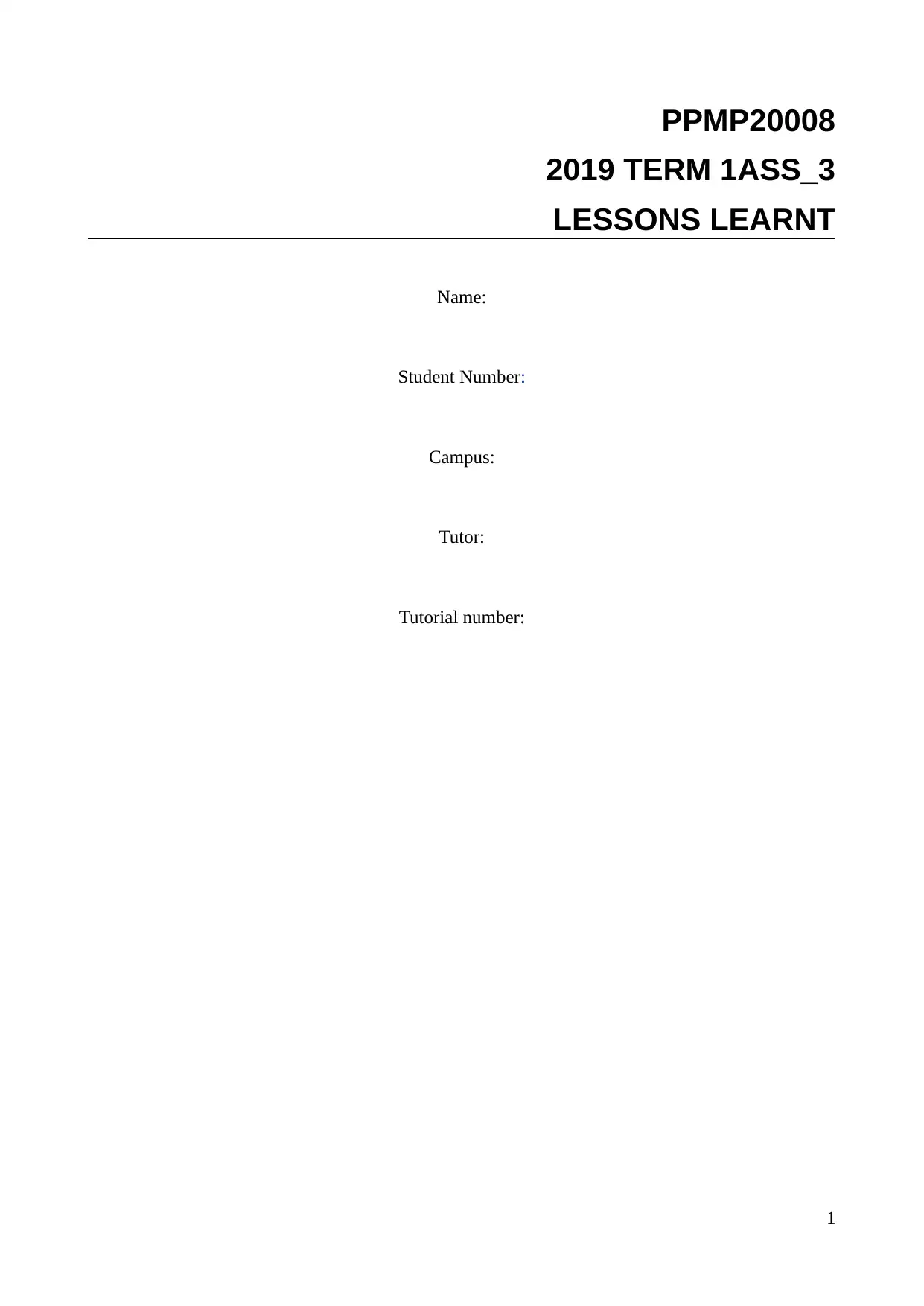
PPMP20008
2019 TERM 1ASS_3
LESSONS LEARNT
Name:
Student Number:
Campus:
Tutor:
Tutorial number:
1
2019 TERM 1ASS_3
LESSONS LEARNT
Name:
Student Number:
Campus:
Tutor:
Tutorial number:
1
Paraphrase This Document
Need a fresh take? Get an instant paraphrase of this document with our AI Paraphraser
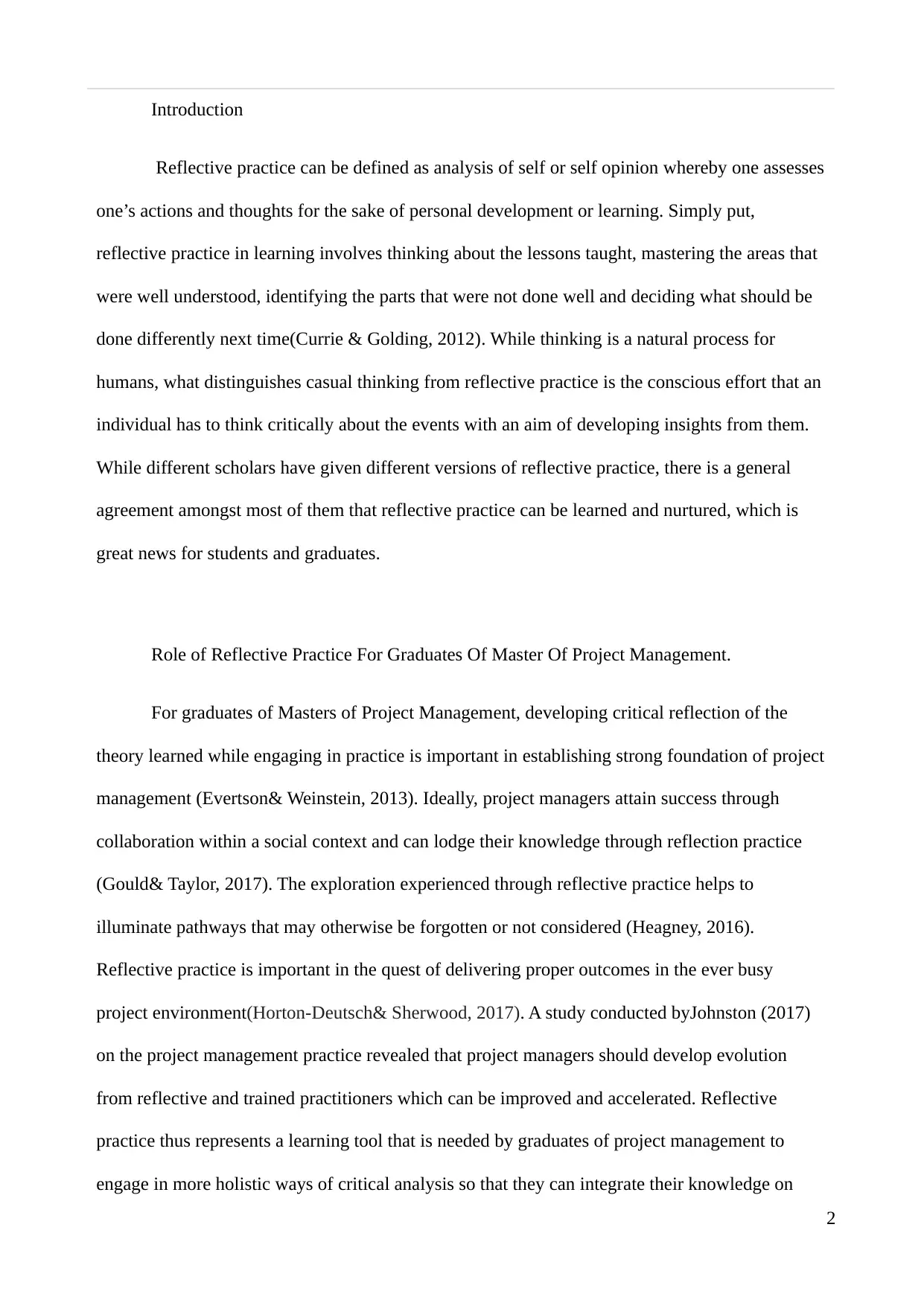
Introduction
Reflective practice can be defined as analysis of self or self opinion whereby one assesses
one’s actions and thoughts for the sake of personal development or learning. Simply put,
reflective practice in learning involves thinking about the lessons taught, mastering the areas that
were well understood, identifying the parts that were not done well and deciding what should be
done differently next time(Currie & Golding, 2012). While thinking is a natural process for
humans, what distinguishes casual thinking from reflective practice is the conscious effort that an
individual has to think critically about the events with an aim of developing insights from them.
While different scholars have given different versions of reflective practice, there is a general
agreement amongst most of them that reflective practice can be learned and nurtured, which is
great news for students and graduates.
Role of Reflective Practice For Graduates Of Master Of Project Management.
For graduates of Masters of Project Management, developing critical reflection of the
theory learned while engaging in practice is important in establishing strong foundation of project
management (Evertson& Weinstein, 2013). Ideally, project managers attain success through
collaboration within a social context and can lodge their knowledge through reflection practice
(Gould& Taylor, 2017). The exploration experienced through reflective practice helps to
illuminate pathways that may otherwise be forgotten or not considered (Heagney, 2016).
Reflective practice is important in the quest of delivering proper outcomes in the ever busy
project environment(Horton-Deutsch& Sherwood, 2017). A study conducted byJohnston (2017)
on the project management practice revealed that project managers should develop evolution
from reflective and trained practitioners which can be improved and accelerated. Reflective
practice thus represents a learning tool that is needed by graduates of project management to
engage in more holistic ways of critical analysis so that they can integrate their knowledge on
2
Reflective practice can be defined as analysis of self or self opinion whereby one assesses
one’s actions and thoughts for the sake of personal development or learning. Simply put,
reflective practice in learning involves thinking about the lessons taught, mastering the areas that
were well understood, identifying the parts that were not done well and deciding what should be
done differently next time(Currie & Golding, 2012). While thinking is a natural process for
humans, what distinguishes casual thinking from reflective practice is the conscious effort that an
individual has to think critically about the events with an aim of developing insights from them.
While different scholars have given different versions of reflective practice, there is a general
agreement amongst most of them that reflective practice can be learned and nurtured, which is
great news for students and graduates.
Role of Reflective Practice For Graduates Of Master Of Project Management.
For graduates of Masters of Project Management, developing critical reflection of the
theory learned while engaging in practice is important in establishing strong foundation of project
management (Evertson& Weinstein, 2013). Ideally, project managers attain success through
collaboration within a social context and can lodge their knowledge through reflection practice
(Gould& Taylor, 2017). The exploration experienced through reflective practice helps to
illuminate pathways that may otherwise be forgotten or not considered (Heagney, 2016).
Reflective practice is important in the quest of delivering proper outcomes in the ever busy
project environment(Horton-Deutsch& Sherwood, 2017). A study conducted byJohnston (2017)
on the project management practice revealed that project managers should develop evolution
from reflective and trained practitioners which can be improved and accelerated. Reflective
practice thus represents a learning tool that is needed by graduates of project management to
engage in more holistic ways of critical analysis so that they can integrate their knowledge on
2
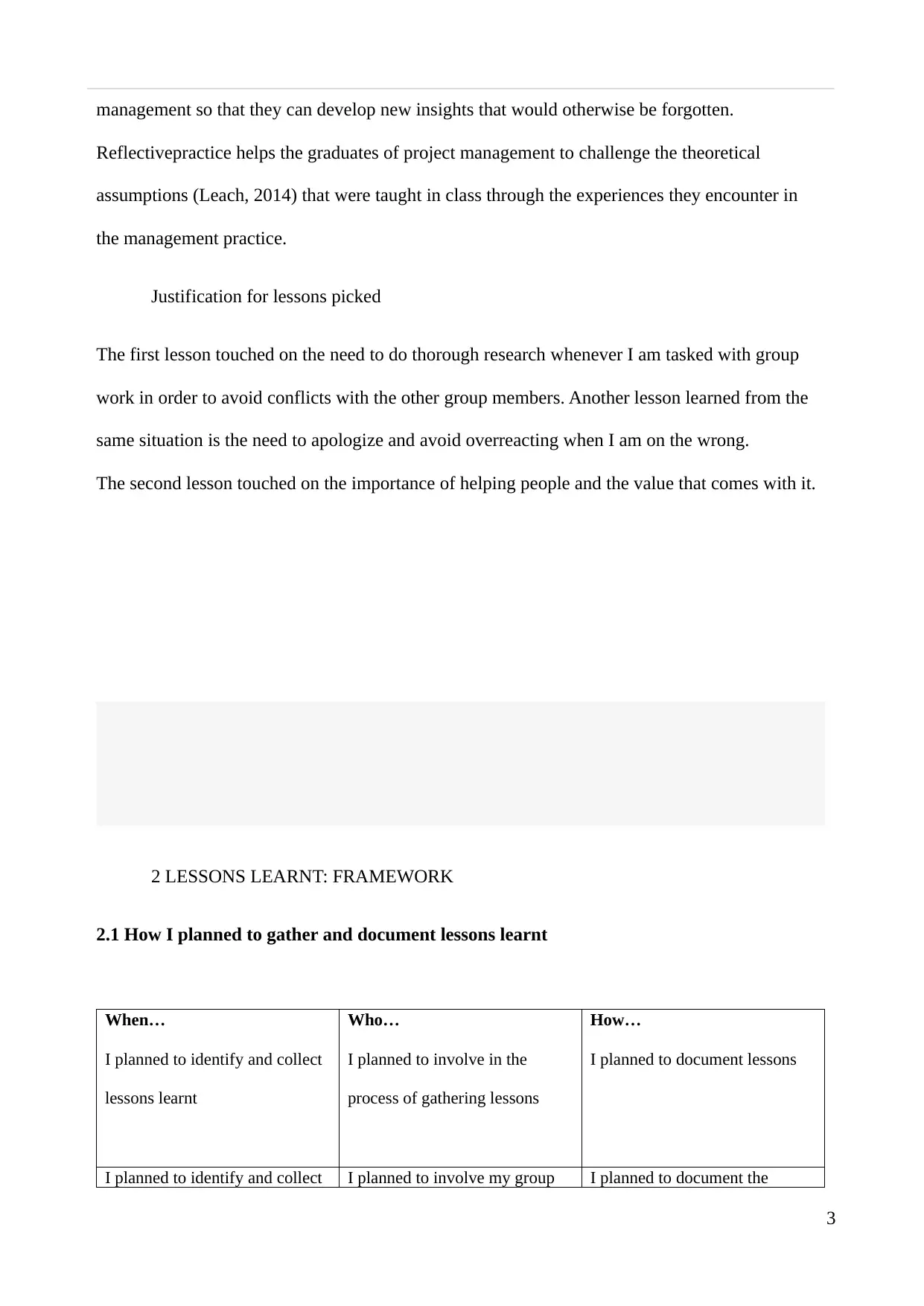
management so that they can develop new insights that would otherwise be forgotten.
Reflectivepractice helps the graduates of project management to challenge the theoretical
assumptions (Leach, 2014) that were taught in class through the experiences they encounter in
the management practice.
Justification for lessons picked
The first lesson touched on the need to do thorough research whenever I am tasked with group
work in order to avoid conflicts with the other group members. Another lesson learned from the
same situation is the need to apologize and avoid overreacting when I am on the wrong.
The second lesson touched on the importance of helping people and the value that comes with it.
2 LESSONS LEARNT: FRAMEWORK
2.1 How I planned to gather and document lessons learnt
When…
I planned to identify and collect
lessons learnt
Who…
I planned to involve in the
process of gathering lessons
How…
I planned to document lessons
I planned to identify and collect I planned to involve my group I planned to document the
3
Reflectivepractice helps the graduates of project management to challenge the theoretical
assumptions (Leach, 2014) that were taught in class through the experiences they encounter in
the management practice.
Justification for lessons picked
The first lesson touched on the need to do thorough research whenever I am tasked with group
work in order to avoid conflicts with the other group members. Another lesson learned from the
same situation is the need to apologize and avoid overreacting when I am on the wrong.
The second lesson touched on the importance of helping people and the value that comes with it.
2 LESSONS LEARNT: FRAMEWORK
2.1 How I planned to gather and document lessons learnt
When…
I planned to identify and collect
lessons learnt
Who…
I planned to involve in the
process of gathering lessons
How…
I planned to document lessons
I planned to identify and collect I planned to involve my group I planned to document the
3
⊘ This is a preview!⊘
Do you want full access?
Subscribe today to unlock all pages.

Trusted by 1+ million students worldwide
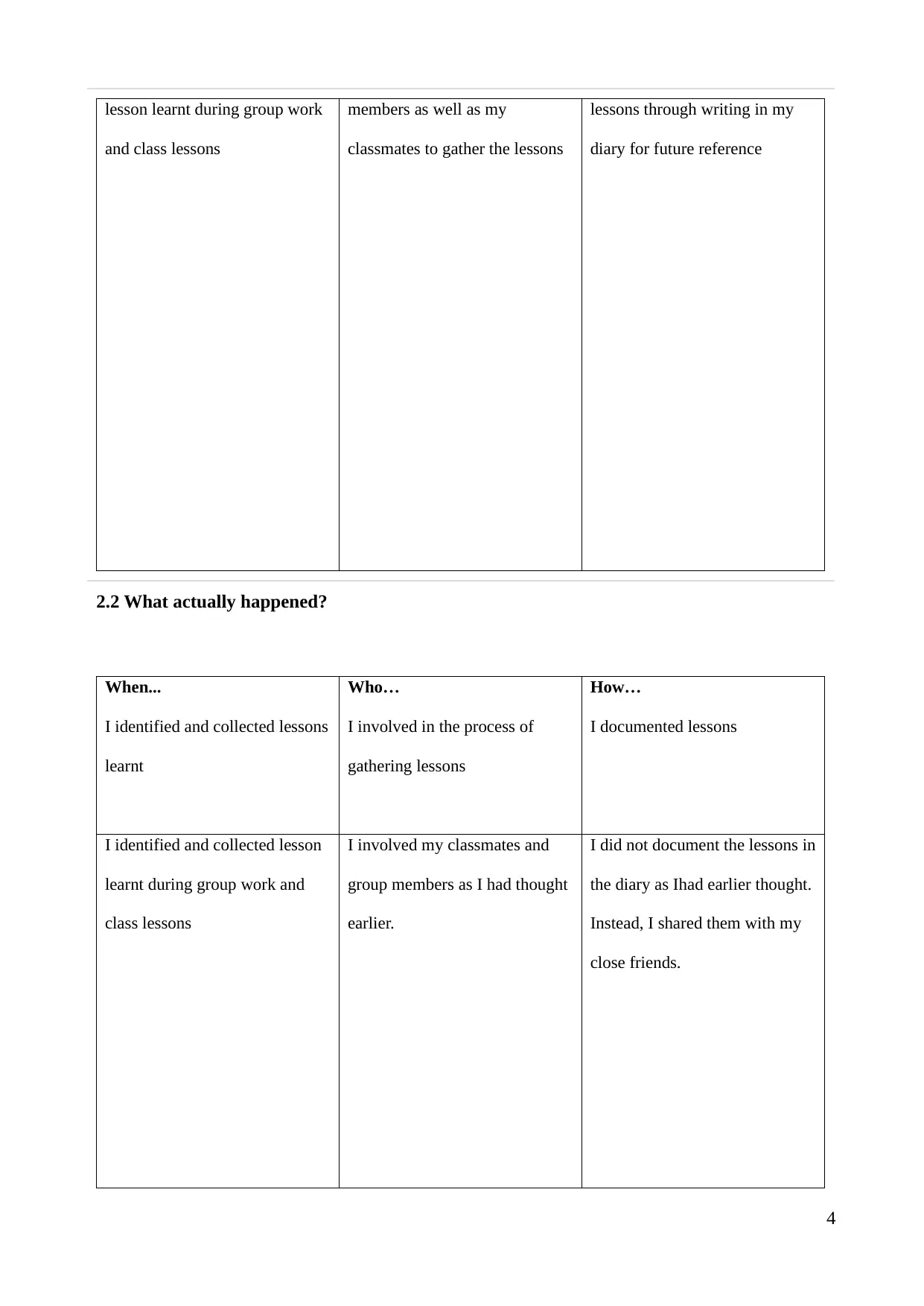
lesson learnt during group work
and class lessons
members as well as my
classmates to gather the lessons
lessons through writing in my
diary for future reference
2.2 What actually happened?
When...
I identified and collected lessons
learnt
Who…
I involved in the process of
gathering lessons
How…
I documented lessons
I identified and collected lesson
learnt during group work and
class lessons
I involved my classmates and
group members as I had thought
earlier.
I did not document the lessons in
the diary as Ihad earlier thought.
Instead, I shared them with my
close friends.
4
and class lessons
members as well as my
classmates to gather the lessons
lessons through writing in my
diary for future reference
2.2 What actually happened?
When...
I identified and collected lessons
learnt
Who…
I involved in the process of
gathering lessons
How…
I documented lessons
I identified and collected lesson
learnt during group work and
class lessons
I involved my classmates and
group members as I had thought
earlier.
I did not document the lessons in
the diary as Ihad earlier thought.
Instead, I shared them with my
close friends.
4
Paraphrase This Document
Need a fresh take? Get an instant paraphrase of this document with our AI Paraphraser
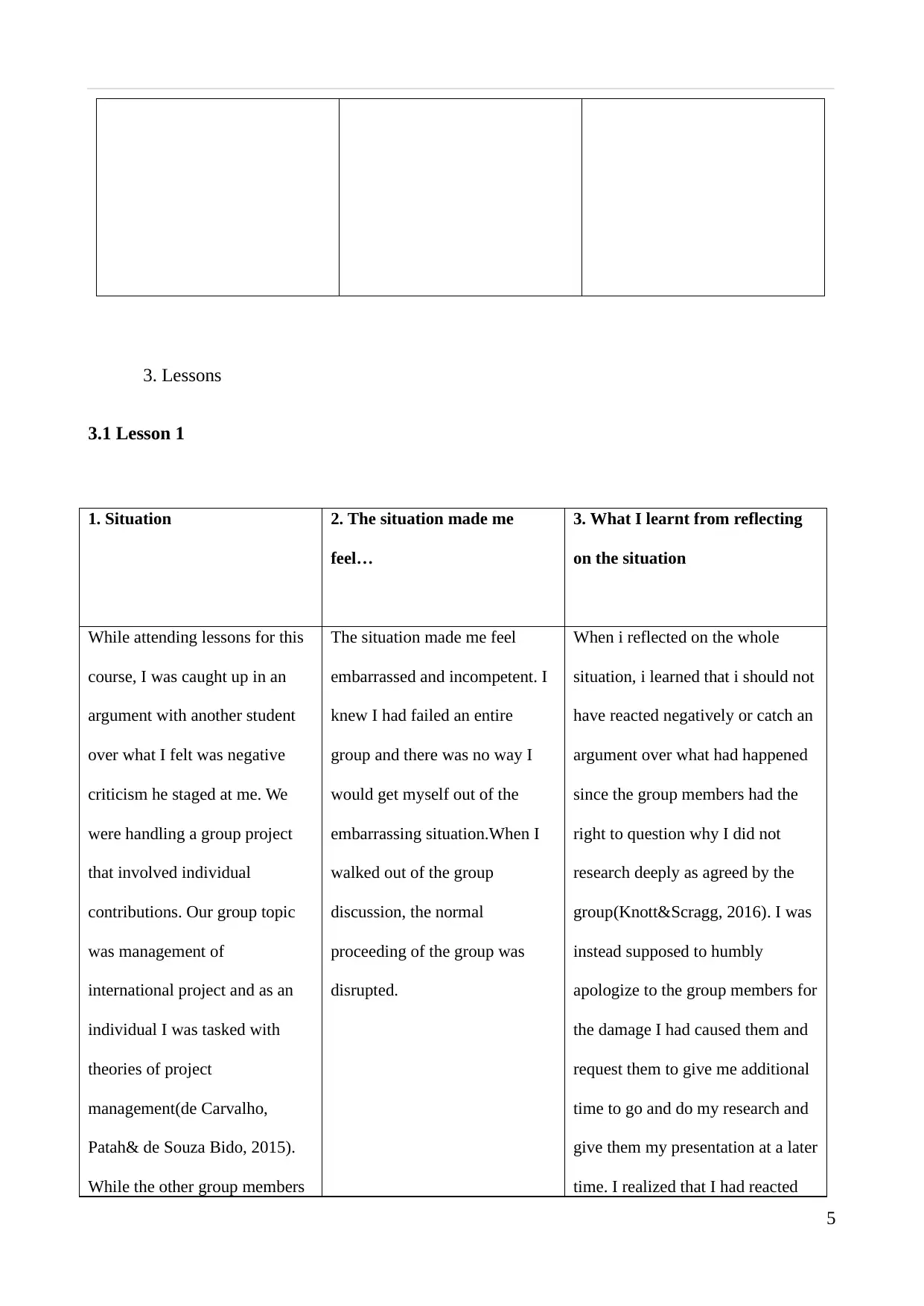
3. Lessons
3.1 Lesson 1
1. Situation 2. The situation made me
feel…
3. What I learnt from reflecting
on the situation
While attending lessons for this
course, I was caught up in an
argument with another student
over what I felt was negative
criticism he staged at me. We
were handling a group project
that involved individual
contributions. Our group topic
was management of
international project and as an
individual I was tasked with
theories of project
management(de Carvalho,
Patah& de Souza Bido, 2015).
While the other group members
The situation made me feel
embarrassed and incompetent. I
knew I had failed an entire
group and there was no way I
would get myself out of the
embarrassing situation.When I
walked out of the group
discussion, the normal
proceeding of the group was
disrupted.
When i reflected on the whole
situation, i learned that i should not
have reacted negatively or catch an
argument over what had happened
since the group members had the
right to question why I did not
research deeply as agreed by the
group(Knott&Scragg, 2016). I was
instead supposed to humbly
apologize to the group members for
the damage I had caused them and
request them to give me additional
time to go and do my research and
give them my presentation at a later
time. I realized that I had reacted
5
3.1 Lesson 1
1. Situation 2. The situation made me
feel…
3. What I learnt from reflecting
on the situation
While attending lessons for this
course, I was caught up in an
argument with another student
over what I felt was negative
criticism he staged at me. We
were handling a group project
that involved individual
contributions. Our group topic
was management of
international project and as an
individual I was tasked with
theories of project
management(de Carvalho,
Patah& de Souza Bido, 2015).
While the other group members
The situation made me feel
embarrassed and incompetent. I
knew I had failed an entire
group and there was no way I
would get myself out of the
embarrassing situation.When I
walked out of the group
discussion, the normal
proceeding of the group was
disrupted.
When i reflected on the whole
situation, i learned that i should not
have reacted negatively or catch an
argument over what had happened
since the group members had the
right to question why I did not
research deeply as agreed by the
group(Knott&Scragg, 2016). I was
instead supposed to humbly
apologize to the group members for
the damage I had caused them and
request them to give me additional
time to go and do my research and
give them my presentation at a later
time. I realized that I had reacted
5
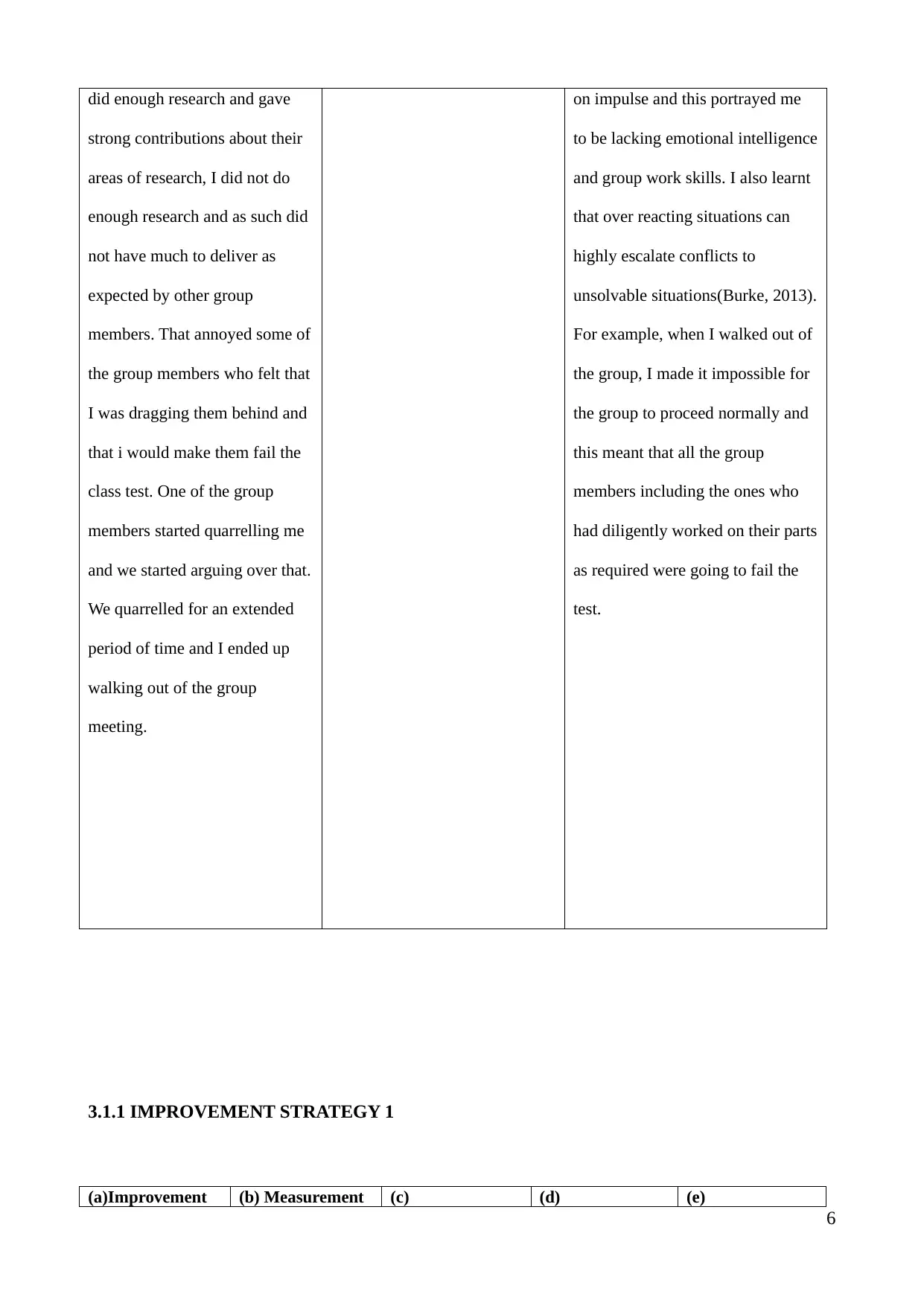
did enough research and gave
strong contributions about their
areas of research, I did not do
enough research and as such did
not have much to deliver as
expected by other group
members. That annoyed some of
the group members who felt that
I was dragging them behind and
that i would make them fail the
class test. One of the group
members started quarrelling me
and we started arguing over that.
We quarrelled for an extended
period of time and I ended up
walking out of the group
meeting.
on impulse and this portrayed me
to be lacking emotional intelligence
and group work skills. I also learnt
that over reacting situations can
highly escalate conflicts to
unsolvable situations(Burke, 2013).
For example, when I walked out of
the group, I made it impossible for
the group to proceed normally and
this meant that all the group
members including the ones who
had diligently worked on their parts
as required were going to fail the
test.
3.1.1 IMPROVEMENT STRATEGY 1
(a)Improvement (b) Measurement (c) (d) (e)
6
strong contributions about their
areas of research, I did not do
enough research and as such did
not have much to deliver as
expected by other group
members. That annoyed some of
the group members who felt that
I was dragging them behind and
that i would make them fail the
class test. One of the group
members started quarrelling me
and we started arguing over that.
We quarrelled for an extended
period of time and I ended up
walking out of the group
meeting.
on impulse and this portrayed me
to be lacking emotional intelligence
and group work skills. I also learnt
that over reacting situations can
highly escalate conflicts to
unsolvable situations(Burke, 2013).
For example, when I walked out of
the group, I made it impossible for
the group to proceed normally and
this meant that all the group
members including the ones who
had diligently worked on their parts
as required were going to fail the
test.
3.1.1 IMPROVEMENT STRATEGY 1
(a)Improvement (b) Measurement (c) (d) (e)
6
⊘ This is a preview!⊘
Do you want full access?
Subscribe today to unlock all pages.

Trusted by 1+ million students worldwide
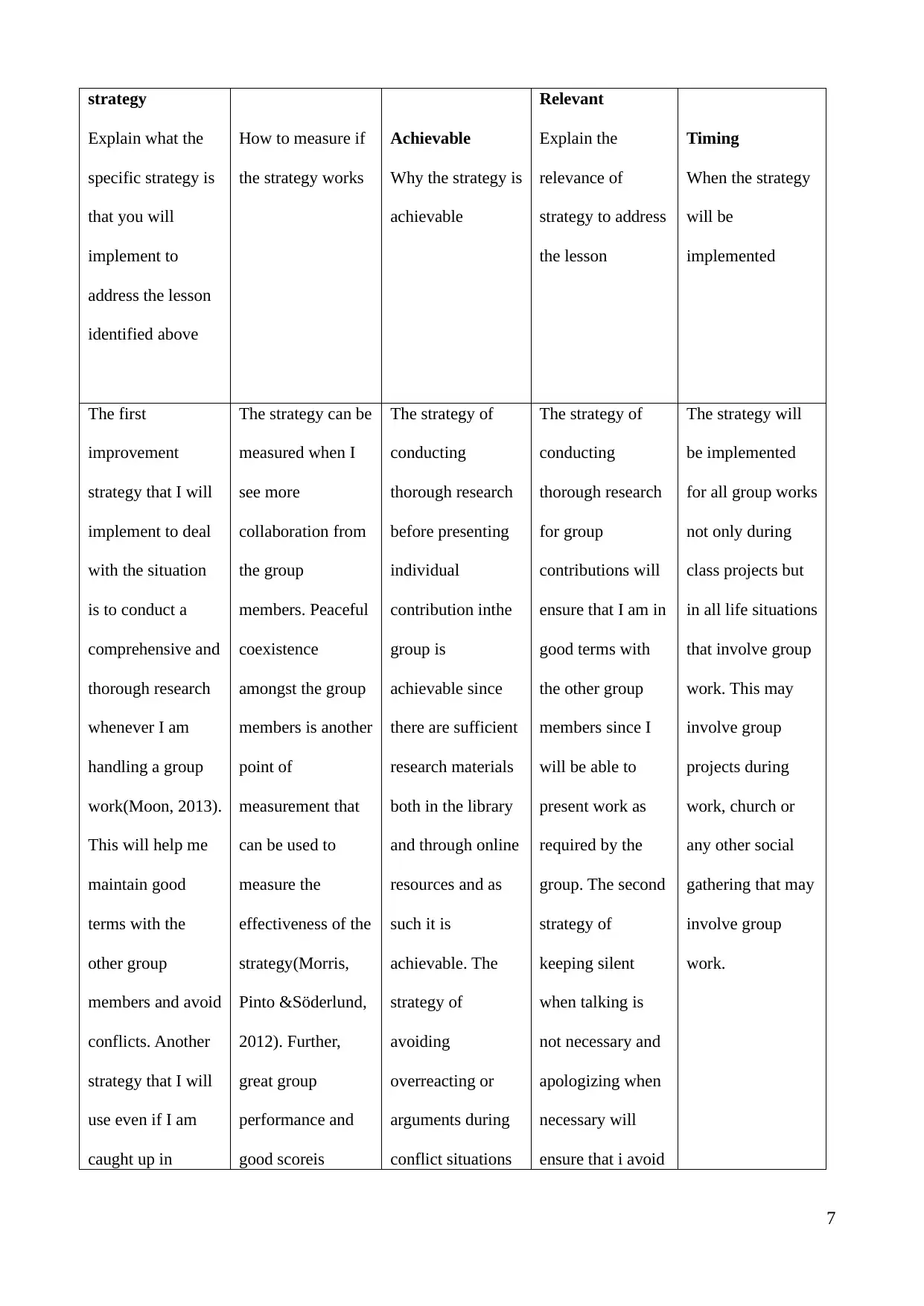
strategy
Explain what the
specific strategy is
that you will
implement to
address the lesson
identified above
How to measure if
the strategy works
Achievable
Why the strategy is
achievable
Relevant
Explain the
relevance of
strategy to address
the lesson
Timing
When the strategy
will be
implemented
The first
improvement
strategy that I will
implement to deal
with the situation
is to conduct a
comprehensive and
thorough research
whenever I am
handling a group
work(Moon, 2013).
This will help me
maintain good
terms with the
other group
members and avoid
conflicts. Another
strategy that I will
use even if I am
caught up in
The strategy can be
measured when I
see more
collaboration from
the group
members. Peaceful
coexistence
amongst the group
members is another
point of
measurement that
can be used to
measure the
effectiveness of the
strategy(Morris,
Pinto &Söderlund,
2012). Further,
great group
performance and
good scoreis
The strategy of
conducting
thorough research
before presenting
individual
contribution inthe
group is
achievable since
there are sufficient
research materials
both in the library
and through online
resources and as
such it is
achievable. The
strategy of
avoiding
overreacting or
arguments during
conflict situations
The strategy of
conducting
thorough research
for group
contributions will
ensure that I am in
good terms with
the other group
members since I
will be able to
present work as
required by the
group. The second
strategy of
keeping silent
when talking is
not necessary and
apologizing when
necessary will
ensure that i avoid
The strategy will
be implemented
for all group works
not only during
class projects but
in all life situations
that involve group
work. This may
involve group
projects during
work, church or
any other social
gathering that may
involve group
work.
7
Explain what the
specific strategy is
that you will
implement to
address the lesson
identified above
How to measure if
the strategy works
Achievable
Why the strategy is
achievable
Relevant
Explain the
relevance of
strategy to address
the lesson
Timing
When the strategy
will be
implemented
The first
improvement
strategy that I will
implement to deal
with the situation
is to conduct a
comprehensive and
thorough research
whenever I am
handling a group
work(Moon, 2013).
This will help me
maintain good
terms with the
other group
members and avoid
conflicts. Another
strategy that I will
use even if I am
caught up in
The strategy can be
measured when I
see more
collaboration from
the group
members. Peaceful
coexistence
amongst the group
members is another
point of
measurement that
can be used to
measure the
effectiveness of the
strategy(Morris,
Pinto &Söderlund,
2012). Further,
great group
performance and
good scoreis
The strategy of
conducting
thorough research
before presenting
individual
contribution inthe
group is
achievable since
there are sufficient
research materials
both in the library
and through online
resources and as
such it is
achievable. The
strategy of
avoiding
overreacting or
arguments during
conflict situations
The strategy of
conducting
thorough research
for group
contributions will
ensure that I am in
good terms with
the other group
members since I
will be able to
present work as
required by the
group. The second
strategy of
keeping silent
when talking is
not necessary and
apologizing when
necessary will
ensure that i avoid
The strategy will
be implemented
for all group works
not only during
class projects but
in all life situations
that involve group
work. This may
involve group
projects during
work, church or
any other social
gathering that may
involve group
work.
7
Paraphrase This Document
Need a fresh take? Get an instant paraphrase of this document with our AI Paraphraser
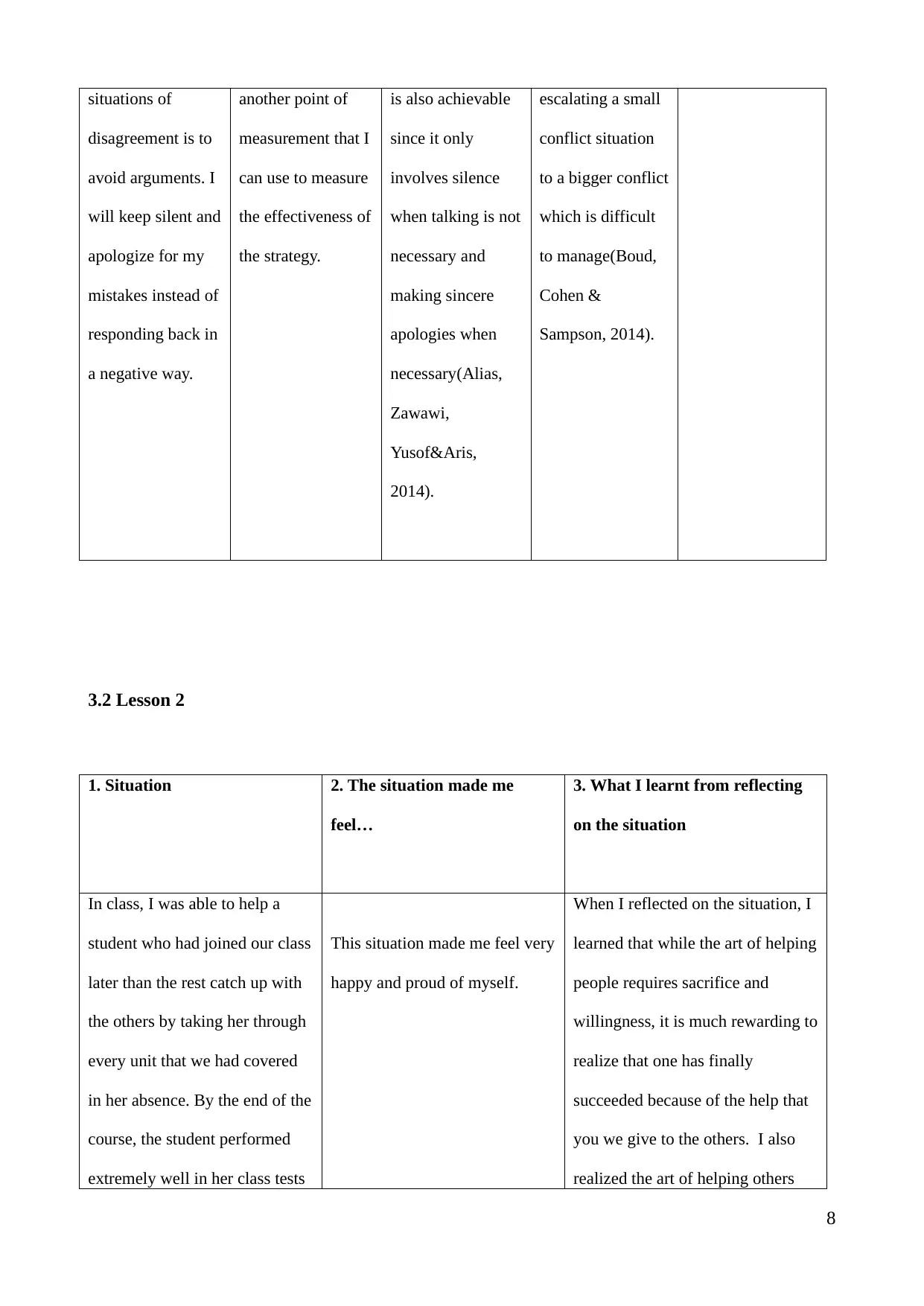
situations of
disagreement is to
avoid arguments. I
will keep silent and
apologize for my
mistakes instead of
responding back in
a negative way.
another point of
measurement that I
can use to measure
the effectiveness of
the strategy.
is also achievable
since it only
involves silence
when talking is not
necessary and
making sincere
apologies when
necessary(Alias,
Zawawi,
Yusof&Aris,
2014).
escalating a small
conflict situation
to a bigger conflict
which is difficult
to manage(Boud,
Cohen &
Sampson, 2014).
3.2 Lesson 2
1. Situation 2. The situation made me
feel…
3. What I learnt from reflecting
on the situation
In class, I was able to help a
student who had joined our class
later than the rest catch up with
the others by taking her through
every unit that we had covered
in her absence. By the end of the
course, the student performed
extremely well in her class tests
This situation made me feel very
happy and proud of myself.
When I reflected on the situation, I
learned that while the art of helping
people requires sacrifice and
willingness, it is much rewarding to
realize that one has finally
succeeded because of the help that
you we give to the others. I also
realized the art of helping others
8
disagreement is to
avoid arguments. I
will keep silent and
apologize for my
mistakes instead of
responding back in
a negative way.
another point of
measurement that I
can use to measure
the effectiveness of
the strategy.
is also achievable
since it only
involves silence
when talking is not
necessary and
making sincere
apologies when
necessary(Alias,
Zawawi,
Yusof&Aris,
2014).
escalating a small
conflict situation
to a bigger conflict
which is difficult
to manage(Boud,
Cohen &
Sampson, 2014).
3.2 Lesson 2
1. Situation 2. The situation made me
feel…
3. What I learnt from reflecting
on the situation
In class, I was able to help a
student who had joined our class
later than the rest catch up with
the others by taking her through
every unit that we had covered
in her absence. By the end of the
course, the student performed
extremely well in her class tests
This situation made me feel very
happy and proud of myself.
When I reflected on the situation, I
learned that while the art of helping
people requires sacrifice and
willingness, it is much rewarding to
realize that one has finally
succeeded because of the help that
you we give to the others. I also
realized the art of helping others
8
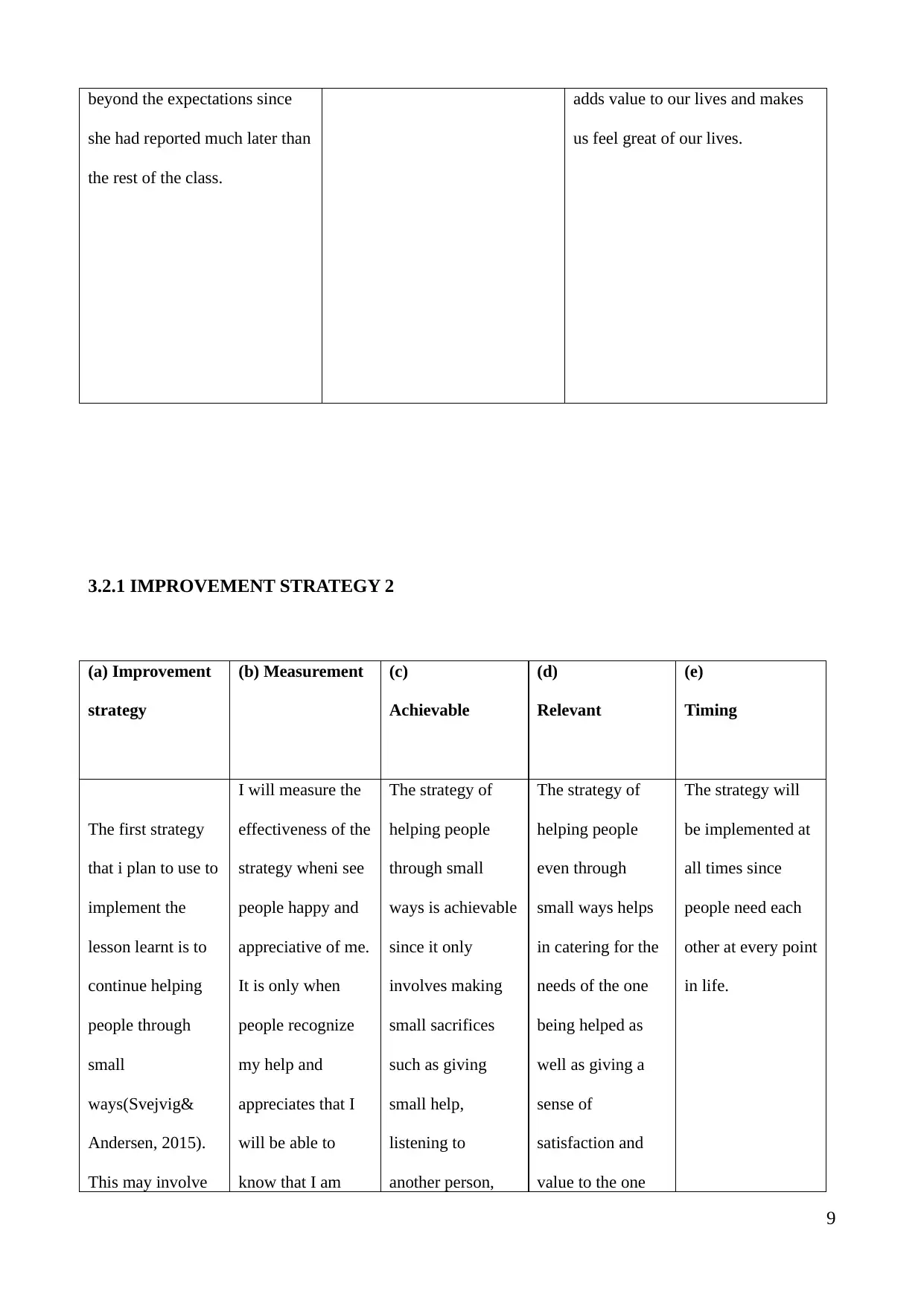
beyond the expectations since
she had reported much later than
the rest of the class.
adds value to our lives and makes
us feel great of our lives.
3.2.1 IMPROVEMENT STRATEGY 2
(a) Improvement
strategy
(b) Measurement (c)
Achievable
(d)
Relevant
(e)
Timing
The first strategy
that i plan to use to
implement the
lesson learnt is to
continue helping
people through
small
ways(Svejvig&
Andersen, 2015).
This may involve
I will measure the
effectiveness of the
strategy wheni see
people happy and
appreciative of me.
It is only when
people recognize
my help and
appreciates that I
will be able to
know that I am
The strategy of
helping people
through small
ways is achievable
since it only
involves making
small sacrifices
such as giving
small help,
listening to
another person,
The strategy of
helping people
even through
small ways helps
in catering for the
needs of the one
being helped as
well as giving a
sense of
satisfaction and
value to the one
The strategy will
be implemented at
all times since
people need each
other at every point
in life.
9
she had reported much later than
the rest of the class.
adds value to our lives and makes
us feel great of our lives.
3.2.1 IMPROVEMENT STRATEGY 2
(a) Improvement
strategy
(b) Measurement (c)
Achievable
(d)
Relevant
(e)
Timing
The first strategy
that i plan to use to
implement the
lesson learnt is to
continue helping
people through
small
ways(Svejvig&
Andersen, 2015).
This may involve
I will measure the
effectiveness of the
strategy wheni see
people happy and
appreciative of me.
It is only when
people recognize
my help and
appreciates that I
will be able to
know that I am
The strategy of
helping people
through small
ways is achievable
since it only
involves making
small sacrifices
such as giving
small help,
listening to
another person,
The strategy of
helping people
even through
small ways helps
in catering for the
needs of the one
being helped as
well as giving a
sense of
satisfaction and
value to the one
The strategy will
be implemented at
all times since
people need each
other at every point
in life.
9
⊘ This is a preview!⊘
Do you want full access?
Subscribe today to unlock all pages.

Trusted by 1+ million students worldwide
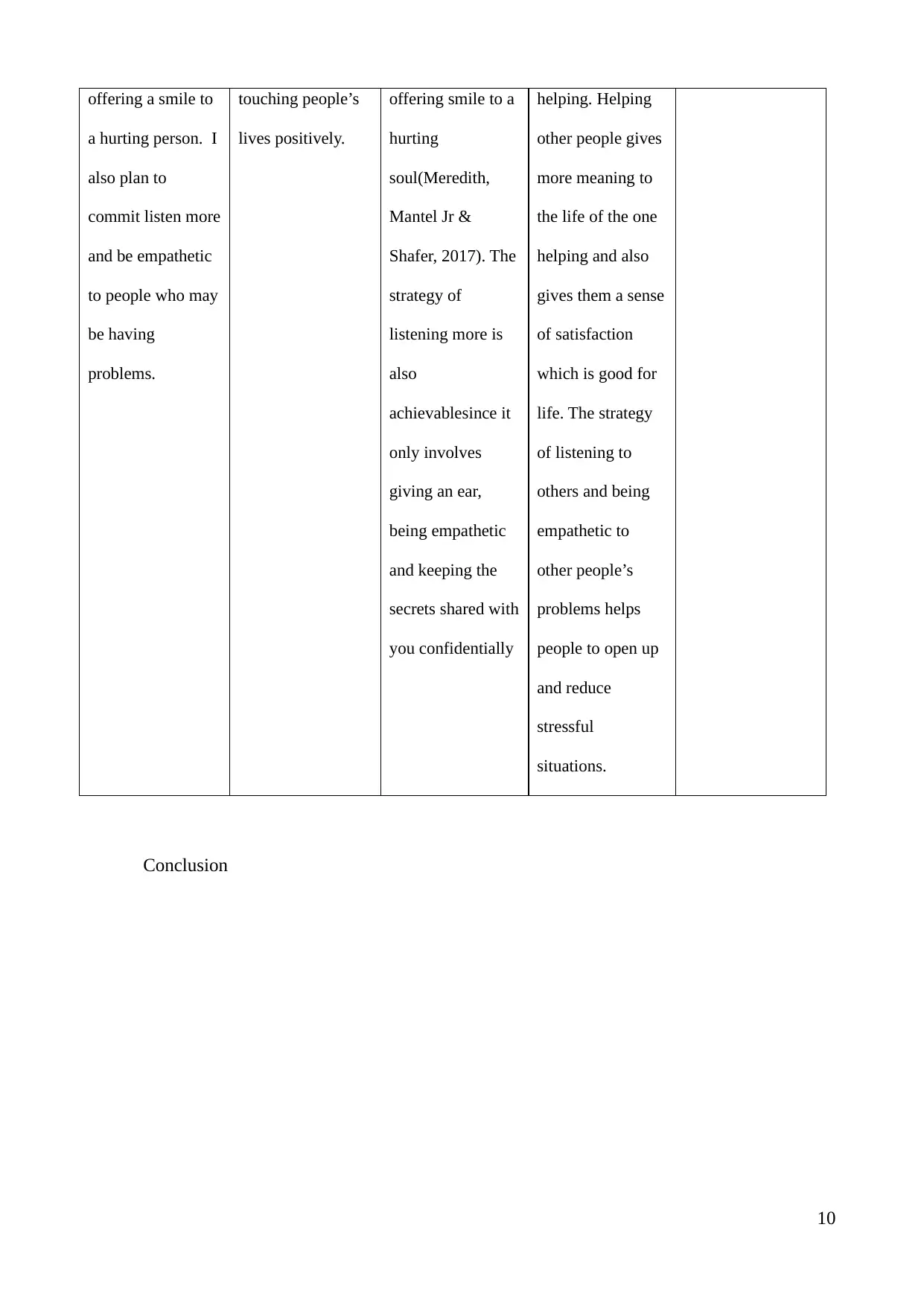
offering a smile to
a hurting person. I
also plan to
commit listen more
and be empathetic
to people who may
be having
problems.
touching people’s
lives positively.
offering smile to a
hurting
soul(Meredith,
Mantel Jr &
Shafer, 2017). The
strategy of
listening more is
also
achievablesince it
only involves
giving an ear,
being empathetic
and keeping the
secrets shared with
you confidentially
helping. Helping
other people gives
more meaning to
the life of the one
helping and also
gives them a sense
of satisfaction
which is good for
life. The strategy
of listening to
others and being
empathetic to
other people’s
problems helps
people to open up
and reduce
stressful
situations.
Conclusion
10
a hurting person. I
also plan to
commit listen more
and be empathetic
to people who may
be having
problems.
touching people’s
lives positively.
offering smile to a
hurting
soul(Meredith,
Mantel Jr &
Shafer, 2017). The
strategy of
listening more is
also
achievablesince it
only involves
giving an ear,
being empathetic
and keeping the
secrets shared with
you confidentially
helping. Helping
other people gives
more meaning to
the life of the one
helping and also
gives them a sense
of satisfaction
which is good for
life. The strategy
of listening to
others and being
empathetic to
other people’s
problems helps
people to open up
and reduce
stressful
situations.
Conclusion
10
Paraphrase This Document
Need a fresh take? Get an instant paraphrase of this document with our AI Paraphraser
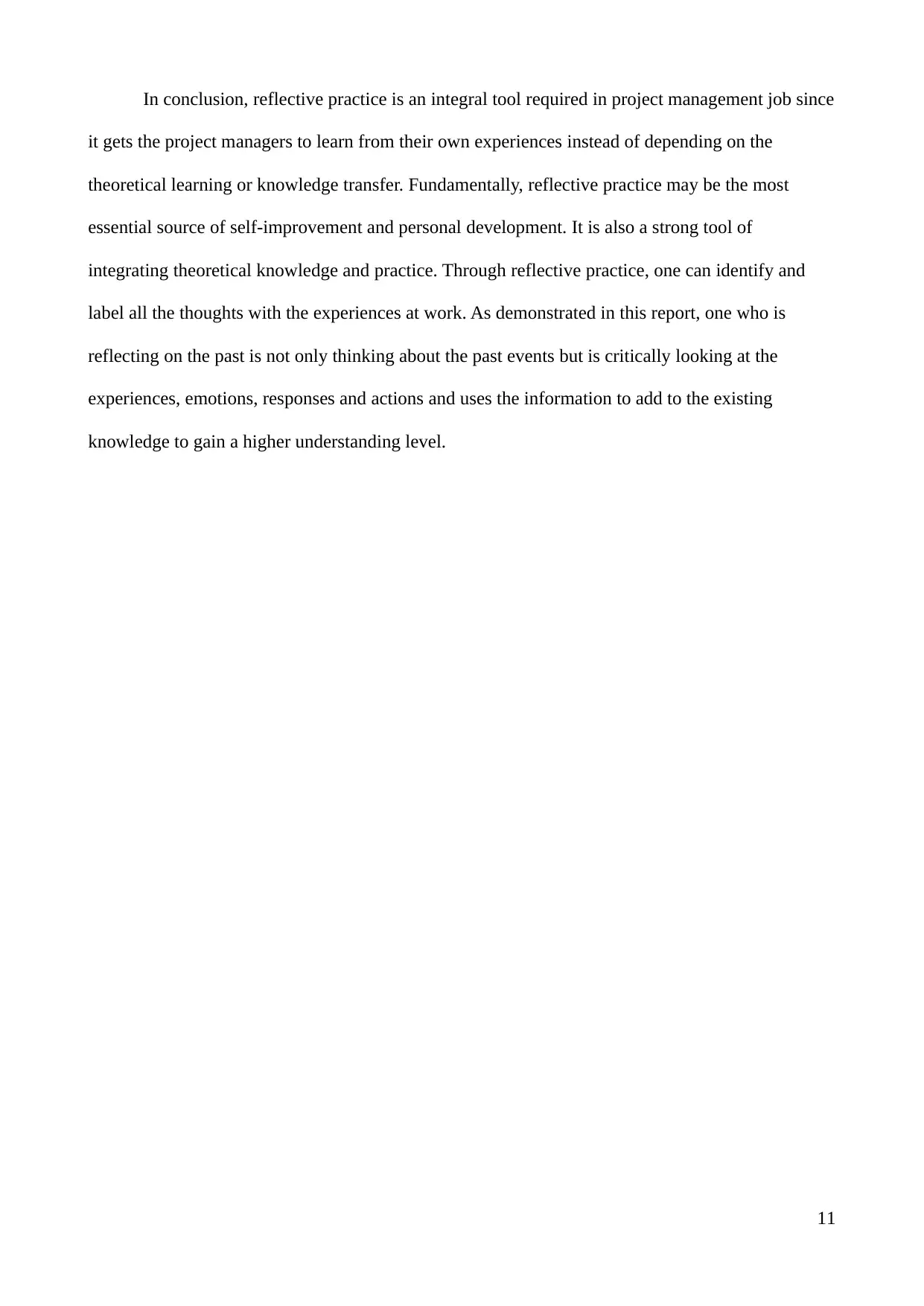
In conclusion, reflective practice is an integral tool required in project management job since
it gets the project managers to learn from their own experiences instead of depending on the
theoretical learning or knowledge transfer. Fundamentally, reflective practice may be the most
essential source of self-improvement and personal development. It is also a strong tool of
integrating theoretical knowledge and practice. Through reflective practice, one can identify and
label all the thoughts with the experiences at work. As demonstrated in this report, one who is
reflecting on the past is not only thinking about the past events but is critically looking at the
experiences, emotions, responses and actions and uses the information to add to the existing
knowledge to gain a higher understanding level.
11
it gets the project managers to learn from their own experiences instead of depending on the
theoretical learning or knowledge transfer. Fundamentally, reflective practice may be the most
essential source of self-improvement and personal development. It is also a strong tool of
integrating theoretical knowledge and practice. Through reflective practice, one can identify and
label all the thoughts with the experiences at work. As demonstrated in this report, one who is
reflecting on the past is not only thinking about the past events but is critically looking at the
experiences, emotions, responses and actions and uses the information to add to the existing
knowledge to gain a higher understanding level.
11
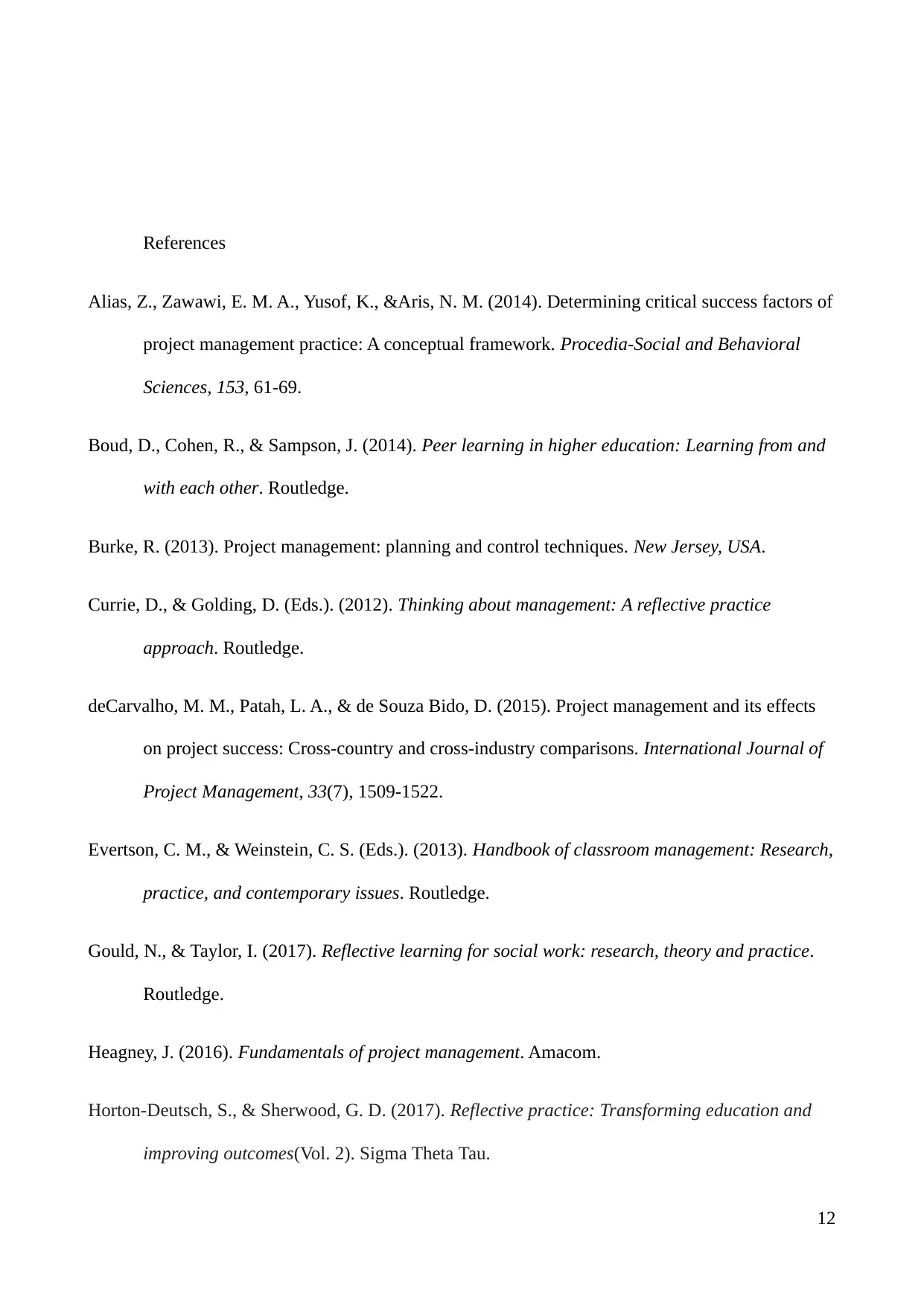
References
Alias, Z., Zawawi, E. M. A., Yusof, K., &Aris, N. M. (2014). Determining critical success factors of
project management practice: A conceptual framework. Procedia-Social and Behavioral
Sciences, 153, 61-69.
Boud, D., Cohen, R., & Sampson, J. (2014). Peer learning in higher education: Learning from and
with each other. Routledge.
Burke, R. (2013). Project management: planning and control techniques. New Jersey, USA.
Currie, D., & Golding, D. (Eds.). (2012). Thinking about management: A reflective practice
approach. Routledge.
deCarvalho, M. M., Patah, L. A., & de Souza Bido, D. (2015). Project management and its effects
on project success: Cross-country and cross-industry comparisons. International Journal of
Project Management, 33(7), 1509-1522.
Evertson, C. M., & Weinstein, C. S. (Eds.). (2013). Handbook of classroom management: Research,
practice, and contemporary issues. Routledge.
Gould, N., & Taylor, I. (2017). Reflective learning for social work: research, theory and practice.
Routledge.
Heagney, J. (2016). Fundamentals of project management. Amacom.
Horton-Deutsch, S., & Sherwood, G. D. (2017). Reflective practice: Transforming education and
improving outcomes(Vol. 2). Sigma Theta Tau.
12
Alias, Z., Zawawi, E. M. A., Yusof, K., &Aris, N. M. (2014). Determining critical success factors of
project management practice: A conceptual framework. Procedia-Social and Behavioral
Sciences, 153, 61-69.
Boud, D., Cohen, R., & Sampson, J. (2014). Peer learning in higher education: Learning from and
with each other. Routledge.
Burke, R. (2013). Project management: planning and control techniques. New Jersey, USA.
Currie, D., & Golding, D. (Eds.). (2012). Thinking about management: A reflective practice
approach. Routledge.
deCarvalho, M. M., Patah, L. A., & de Souza Bido, D. (2015). Project management and its effects
on project success: Cross-country and cross-industry comparisons. International Journal of
Project Management, 33(7), 1509-1522.
Evertson, C. M., & Weinstein, C. S. (Eds.). (2013). Handbook of classroom management: Research,
practice, and contemporary issues. Routledge.
Gould, N., & Taylor, I. (2017). Reflective learning for social work: research, theory and practice.
Routledge.
Heagney, J. (2016). Fundamentals of project management. Amacom.
Horton-Deutsch, S., & Sherwood, G. D. (2017). Reflective practice: Transforming education and
improving outcomes(Vol. 2). Sigma Theta Tau.
12
⊘ This is a preview!⊘
Do you want full access?
Subscribe today to unlock all pages.

Trusted by 1+ million students worldwide
1 out of 13
Related Documents
Your All-in-One AI-Powered Toolkit for Academic Success.
+13062052269
info@desklib.com
Available 24*7 on WhatsApp / Email
![[object Object]](/_next/static/media/star-bottom.7253800d.svg)
Unlock your academic potential
Copyright © 2020–2026 A2Z Services. All Rights Reserved. Developed and managed by ZUCOL.



